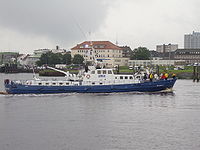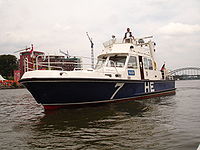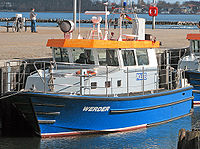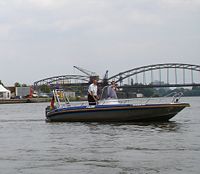
Wasserschutzpolizei
Encyclopedia




The Wasserschutzpolizei (WSP - literally translated "Water Protection Police" in German
German language
German is a West Germanic language, related to and classified alongside English and Dutch. With an estimated 90 – 98 million native speakers, German is one of the world's major languages and is the most widely-spoken first language in the European Union....
) is the water police
Water police
Water police, also called harbour patrols, port police, marine/maritime police, nautical patrols, bay constables or river police, are police officers, usually a department of a larger police organisation, who patrol in water craft...
that patrols the waterways, lakes and harbours of Germany around the clock. The WSP are part of the Landespolizei
Landespolizei
thumb|[[Germany|German]] police officer in [[Hamburg]]The Landespolizei are the main police forces of Germany. They are under the sole jurisdiction, funded and operated by the states of Germany.-History:...
(State Police).
Germany has about 7,500 km of navigable waterways that are responsible for about 30 percent of goods transported. The heavy commercial traffic and increasing recreational boat traffic requires police supervision. In case of shipwrecks, often involving hazardous materials, they are responsible for warning other shipping. The WSP also often performs other duties such as enforcing environmental laws.
These police officers in Navy-like uniforms often have inland or maritime shipping experience and are trained at the German Water Police School (Wasserschutzpolizeischule) in Hamburg
Hamburg
-History:The first historic name for the city was, according to Claudius Ptolemy's reports, Treva.But the city takes its modern name, Hamburg, from the first permanent building on the site, a castle whose construction was ordered by the Emperor Charlemagne in AD 808...
. For practical reasons the WSP of one state may have jurisdiction in the territory of another state (for example, the Hamburg WSP is in charge of a section of the Elbe River that spans the states of Mecklenburg-Vorpommern, Lower Saxony, Schleswig-Holstein, and Hamburg.)
Baden-Württemberg
The Baden-WürttembergBaden-Württemberg
Baden-Württemberg is one of the 16 states of Germany. Baden-Württemberg is in the southwestern part of the country to the east of the Upper Rhine, and is the third largest in both area and population of Germany's sixteen states, with an area of and 10.7 million inhabitants...
WSP is decentrally organized and attached to the police departments whose area of operations their stations are located in. Baden-Württemberg Police
Baden-Württemberg Police
Baden-Württemberg Police numbers approx. 25,000 police officers and 7,000 civilian employees.The four regional police authorities are headquartered in Karlsruhe, Stuttgart, Freiburg and Tübingen. There is also a separate police authority for the city of Stuttgart...
changed to this structure in 2005. There are eight river police stations in Baden-Württemberg along the Rhine and Neckar
Neckar
The Neckar is a long river, mainly flowing through the southwestern state of Baden-Württemberg, but also a short section through Hesse, in Germany. The Neckar is a major right tributary of the River Rhine...
rivers and on Lake Constance
Lake Constance
Lake Constance is a lake on the Rhine at the northern foot of the Alps, and consists of three bodies of water: the Obersee , the Untersee , and a connecting stretch of the Rhine, called the Seerhein.The lake is situated in Germany, Switzerland and Austria near the Alps...
.
Bavaria
The Bavarian River Police is part of the Bavarian State PoliceBavarian State Police
The Bavarian State Police has approximately 32,000 officers and roughly 5,600 civilian employees and is therefore one of the biggest police forces in Germany.-Organisation:The 10 regional police authorities in Bavaria are:...
. The Bavarian River Police Centre is part of the Central Franconia Police HQ and is in Schwabach
Schwabach
Schwabach is a German town of about 40,000 inhabitants near Nuremberg, in the center of the region of Franconia in the North of Bavaria. The city is an autonomous administrative district . Schwabach is also the name of a river which runs through the city prior joining the Rednitz.Schwabach is...
. The centre supports nine river police stations along the Main River
Main river
Main rivers are a statutory type of watercourse in England and Wales, usually larger streams and rivers, but also include some smaller watercourses. A main river is defined as a watercourse marked as such on a main river map, and can include any structure or appliance for controlling or regulating...
, Danube
Danube
The Danube is a river in the Central Europe and the Europe's second longest river after the Volga. It is classified as an international waterway....
and the Main-Danube Canal as well as 14 police stations with water police missions on the 25 largest lakes in Bavaria.
Berlin
The Berlin WSP is responsible for patrolling the extensive waterway network of the city and state of BerlinBerlin
Berlin is the capital city of Germany and is one of the 16 states of Germany. With a population of 3.45 million people, Berlin is Germany's largest city. It is the second most populous city proper and the seventh most populous urban area in the European Union...
, and forms part of Central Directorate of the Berlin Police. Besides the normal responsibilities of the water police, the Berlin WSP also has an important security role because of the many government and other capital city related buildings to be found alongside the River Spree
Spree
The Spree is a river that flows through the Saxony, Brandenburg and Berlin states of Germany, and in the Ústí nad Labem region of the Czech Republic...
and other inner-urban waterways.
The Berlin WSP comprises three geographically based Wachen. WSP West operates out of a police station on the River Havel
Havel
The Havel is a river in north-eastern Germany, flowing through the German states of Mecklenburg-Vorpommern, Brandenburg, Berlin and Saxony-Anhalt. It is a right tributary of the Elbe river and in length...
at Spandau
Spandau
Spandau is the fifth of the twelve boroughs of Berlin. It is the fourth largest and westernmost borough, situated at the confluence of the Havel and Spree rivers and along the western bank of the Havel, but the least populated.-Overview:...
, WSP Mitte operates from a station at the junction of the River Spree
Spree
The Spree is a river that flows through the Saxony, Brandenburg and Berlin states of Germany, and in the Ústí nad Labem region of the Czech Republic...
and the Charlottenburg Canal
Charlottenburg Canal
The Charlottenburg Canal, or Charlottenburger Verbindungskanal in German, is a canal in Berlin, Germany.With a former length of , the canal was built between 1848 and 1859, and originally connected the River Spree, in Charlottenburg, with the Berlin-Spandau Ship Canal...
, and WSP Ost operates from a station on the River Spree at Treptow
Treptow
Treptow is a former borough in the southeast of Berlin. It merged with Köpenick to form Treptow-Köpenick in 2001.-Geography:The district was composed by the localities of Alt-Treptow, Plänterwald, Baumschulenweg, Niederschöneweide, Johannisthal, Adlershof, Altglienicke and Bohnsdorf....
.
Brandenburg
The Brandenburg WSP is responsible for patrolling the inland waterways of the state of BrandenburgBrandenburg
Brandenburg is one of the sixteen federal-states of Germany. It lies in the east of the country and is one of the new federal states that were re-created in 1990 upon the reunification of the former West Germany and East Germany. The capital is Potsdam...
, and forms part of the Brandenburg State Police. It operates from nine bases, located at Brandenburg, Eisenhüttenstadt
Eisenhüttenstadt
Eisenhüttenstadt is a town in the Oder-Spree district of Brandenburg, Germany at the border with Poland. The town was founded in 1950 alongside a new steel mill as a socialist model city and has a population of 32,214...
, Erkner
Erkner
-Geography:It is situated on the river Spree, 23 km west of Fürstenwalde, and directly on the border to Berlin-Rahnsdorf....
, Hohensaaten
Hohensaaten
Hohensaaten is a village and a former municipality in Brandenburg in Germany. Since 1 January 2009, it is part of the municipality Bad Freienwalde....
, Lehnitz, Potsdam
Potsdam
Potsdam is the capital city of the German federal state of Brandenburg and part of the Berlin/Brandenburg Metropolitan Region. It is situated on the River Havel, southwest of Berlin city centre....
, Spreewald
Spreewald
The Spreewald is situated about 100 km south-east of Berlin. It was designated a biosphere reserve by UNESCO in 1991. It is known for its traditional irrigation system which consists of more than 200 small channels within the area. The landscape was shaped during the ice-age...
, Wittenberge
Wittenberge
Wittenberge is a town of twenty thousand people on the lower Elbe in the district of Prignitz , Brandenburg, Germany.-History:...
and Zeuthen
Zeuthen
Zeuthen may refer to:*Zeuthen, a town in Brandenburg, Germany*Hieronymus Georg Zeuthen, Danish mathematician*Zeuthen Strategy in Game theory...
.
The Brandenburg WSP operates a fleet of 28 boats of several types.
Bremen
The Bremen WSP is responsible for patrolling the ports and inland waterways of the state of BremenBremen (state)
The Free Hanseatic City of Bremen is the smallest of Germany's 16 states. A more informal name, but used in some official contexts, is Land Bremen .-Geography:...
, and forms part of the Bremen State Police. It operates from bases in Bremen
Bremen
The City Municipality of Bremen is a Hanseatic city in northwestern Germany. A commercial and industrial city with a major port on the river Weser, Bremen is part of the Bremen-Oldenburg metropolitan area . Bremen is the second most populous city in North Germany and tenth in Germany.Bremen is...
and Bremerhaven
Bremerhaven
Bremerhaven is a city at the seaport of the free city-state of Bremen, a state of the Federal Republic of Germany. It forms an enclave in the state of Lower Saxony and is located at the mouth of the River Weser on its eastern bank, opposite the town of Nordenham...
.
Hamburg
The Water Police in HamburgHamburg
-History:The first historic name for the city was, according to Claudius Ptolemy's reports, Treva.But the city takes its modern name, Hamburg, from the first permanent building on the site, a castle whose construction was ordered by the Emperor Charlemagne in AD 808...
is part of the state police
Hamburg Police
The Hamburg Police is the German Landespolizei force for the city-state of Hamburg. Law enforcement in Germany is divided between federal and state agencies...
and patrols the rivers Elbe
Elbe
The Elbe is one of the major rivers of Central Europe. It rises in the Krkonoše Mountains of the northwestern Czech Republic before traversing much of Bohemia , then Germany and flowing into the North Sea at Cuxhaven, 110 km northwest of Hamburg...
, Alster
Alster
The Alster is a right tributary of the River Elbe in Northern Germany. It has its source near Henstedt-Ulzburg, Schleswig-Holstein, flows roughly southwards and reaches the Elbe in Hamburg. In the centre of Hamburg the Alster has been dammed...
, and their branches, as well as parts of the coastal region of the North Sea
North Sea
In the southwest, beyond the Straits of Dover, the North Sea becomes the English Channel connecting to the Atlantic Ocean. In the east, it connects to the Baltic Sea via the Skagerrak and Kattegat, narrow straits that separate Denmark from Norway and Sweden respectively...
.
As of 2009, the Hamburg Water Police had five stations, two of which are not actually in Hamburg. One is located at the mouth of the Elbe
Elbe
The Elbe is one of the major rivers of Central Europe. It rises in the Krkonoše Mountains of the northwestern Czech Republic before traversing much of Bohemia , then Germany and flowing into the North Sea at Cuxhaven, 110 km northwest of Hamburg...
river in Cuxhaven, Lower Saxony
Lower Saxony
Lower Saxony is a German state situated in north-western Germany and is second in area and fourth in population among the sixteen states of Germany...
, and another is a sub-station in Lauenburg, a town in Schleswig-Holstein
Schleswig-Holstein
Schleswig-Holstein is the northernmost of the sixteen states of Germany, comprising most of the historical duchy of Holstein and the southern part of the former Duchy of Schleswig...
. The other three are in Hamburg proper.
Hesse
The Hesse State PoliceHesse State Police
The Hesse State Police numbers approximately 15,500 police officers and 2,500 civilian employees.-Organisation:...
WSP is part of the state's Police Support Group (Bereitschaftspolizei
Bereitschaftspolizei
The Bereitschaftspolizei are the support and rapid reaction units of Germany's police forces...
). The river police has six stations along the Rhine, Main, Fulda
Fulda River
The Fulda is a river in Hesse, Germany. It is one of two headstreams of the Weser . The Fulda is 218 km in length....
, Werra
Werra
The Werra is a river in central Germany, the right-source river of the Weser. The Werra has its source near Eisfeld in southern Thuringia. After 293 km the Werra joins the river Fulda in the town of Hann. Münden, forming the Weser....
and Lahn
Lahn
The Lahn River is a -long, right tributary of the Rhine River in Germany. Its course passes through the federal states of North Rhine-Westphalia , Hesse , and Rhineland-Palatinate ....
rivers and one for the Edersee
Edersee
The Edersee Dam is a hydroelectric dam constructed between 1908 to 1914 across the Eder river, near the small town of Waldeck in northern Hesse, Germany, it lies at the northern edge of the Kellerwald...
Reservoir
Reservoir
A reservoir , artificial lake or dam is used to store water.Reservoirs may be created in river valleys by the construction of a dam or may be built by excavation in the ground or by conventional construction techniques such as brickwork or cast concrete.The term reservoir may also be used to...
. The headquarters of the Hesse WSP is in Mainz-Kastell along with its central investigations group. Hesse has eight large patrol boats and 12 small ones.
North Rhine-Westphalia
The North Rhine-Westphalia PoliceNorth Rhine-Westphalia Police
The North Rhine-Westphalia Police Force is the biggest of the 16 German state police forces because almost a quarter of the German population lives in NRW. Roughly 50,000 officers police about 19 million people.-Constabularies:...
's Water police is centrally organized and patrols over 900 km of waterways. Its headquarters is in Duisburg
Duisburg
- History :A legend recorded by Johannes Aventinus holds that Duisburg, was built by the eponymous Tuisto, mythical progenitor of Germans, ca. 2395 BC...
as part of Duisburg police headquarters and it has stations (Wasserschutzpolizeiwache) in Bonn
Bonn
Bonn is the 19th largest city in Germany. Located in the Cologne/Bonn Region, about 25 kilometres south of Cologne on the river Rhine in the State of North Rhine-Westphalia, it was the capital of West Germany from 1949 to 1990 and the official seat of government of united Germany from 1990 to 1999....
, Cologne
Cologne
Cologne is Germany's fourth-largest city , and is the largest city both in the Germany Federal State of North Rhine-Westphalia and within the Rhine-Ruhr Metropolitan Area, one of the major European metropolitan areas with more than ten million inhabitants.Cologne is located on both sides of the...
, Düsseldorf
Düsseldorf
Düsseldorf is the capital city of the German state of North Rhine-Westphalia and centre of the Rhine-Ruhr metropolitan region.Düsseldorf is an important international business and financial centre and renowned for its fashion and trade fairs. Located centrally within the European Megalopolis, the...
, Wesel
Wesel
Wesel is a city in North Rhine-Westphalia, Germany. It is the capital of the Wesel district.-Division of the town:Suburbs of Wesel include Lackhausen, Obrighoven, Ginderich, Feldmark,Fusternberg, Büderich, Flüren and Blumenkamp.-History:...
, Emmerich
Emmerich
Emmerich am Rhein; , meaning Emmerich at the Rhine is a city on the lower part of the River Rhine in the northwest of the German federal state of North Rhine-Westphalia...
, Münster
Münster
Münster is an independent city in North Rhine-Westphalia, Germany. It is located in the northern part of the state and is considered to be the cultural centre of the Westphalia region. It is also capital of the local government region Münsterland...
, Minden
Minden
Minden is a town of about 83,000 inhabitants in the north-east of North Rhine-Westphalia, Germany. The town extends along both sides of the river Weser. It is the capital of the Kreis of Minden-Lübbecke, which is part of the region of Detmold. Minden is the historic political centre of the...
, Bergeshövede, Datteln
Datteln
Datteln is a town in the district of Recklinghausen, in North Rhine-Westphalia, Germany. It is situated on a crossroads of four canals , which makes it the biggest canal junction in Europe, approx...
and Essen
Essen
- Origin of the name :In German-speaking countries, the name of the city Essen often causes confusion as to its origins, because it is commonly known as the German infinitive of the verb for the act of eating, and/or the German noun for food. Although scholars still dispute the interpretation of...
. The force has 24 boats and patrols the Rhine, Weser, Ems and Ruhr (as far as Essen) rivers and the North German canals.
Rhineland-Palatinate
The Rhineland-Palatinate River Police is part of the Rheinland-Pfalz State PoliceRheinland-Pfalz State Police
Rhineland-Palatinate Police numbers approx. 9,000 police officers. The five regional police authorities are headquartered in Koblenz, Trier, Mainz, Kaiserslautern and Ludwigshafen ....
and directly subordinate to the Ministry of the Interior. The HQ is in Mainz
Mainz
Mainz under the Holy Roman Empire, and previously was a Roman fort city which commanded the west bank of the Rhine and formed part of the northernmost frontier of the Roman Empire...
and there are 10 river police stations along the Rhine, Lahn
Lahn
The Lahn River is a -long, right tributary of the Rhine River in Germany. Its course passes through the federal states of North Rhine-Westphalia , Hesse , and Rhineland-Palatinate ....
, Saar
Saar River
The Saar is a river in northeastern France and western Germany, and a right tributary of the Moselle. It rises in the Vosges mountains on the border of Alsace and Lorraine and flows northwards into the Moselle near Trier. It has two headstreams , that both start near Mont Donon, the highest peak...
and Moselle in Rhineland-Palatinate
Rhineland-Palatinate
Rhineland-Palatinate is one of the 16 states of the Federal Republic of Germany. It has an area of and about four million inhabitants. The capital is Mainz. English speakers also commonly refer to the state by its German name, Rheinland-Pfalz ....
. The stations at Germersheim
Germersheim
Germersheim is a town in the German state of Rhineland-Palatinate, of around 20,000 inhabitants. It is also the seat of the Germersheim district. The neighboring towns and cities are Speyer, Landau, Philippsburg, Karlsruhe and Wörth.-Coat of arms:...
, Ludwigshafen, Mainz, Bingen
Bingen am Rhein
Bingen am Rhein is a town in the Mainz-Bingen district in Rhineland-Palatinate, Germany.The settlement’s original name was Bingium, a Celtic word that may have meant “hole in the rock”, a description of the shoal behind the Mäuseturm, known as the Binger Loch. Bingen was the starting point for the...
, St. Goar and Neuwied
Neuwied
Neuwied is a town in the north of the German state of Rhineland-Palatinate, capital of the District of Neuwied. Neuwied lies on the right bank of the Rhine, 12 km northwest of Koblenz, on the railway from Frankfurt am Main to Cologne...
are responsible for the Rhine only. The stations at Bernkastel and Cochem
Cochem
Cochem is the seat of and the biggest place in the Cochem-Zell district in Rhineland-Palatinate, Germany. With just under 5,000 inhabitants, Cochem falls just behind Kusel, in the like-named district, as Germany's second smallest district seat...
cover only the Moselle. The station in Koblenz
Koblenz
Koblenz is a German city situated on both banks of the Rhine at its confluence with the Moselle, where the Deutsches Eck and its monument are situated.As Koblenz was one of the military posts established by Drusus about 8 BC, the...
is responsible for Rhine, Mosselle and Lahn and the Trier
Trier
Trier, historically called in English Treves is a city in Germany on the banks of the Moselle. It is the oldest city in Germany, founded in or before 16 BC....
station covers the Moselle and Saar.
Saarland
Saarland is a small state and has only one river police station which is in BeckingenBeckingen
Beckingen is a municipality in the district Merzig-Wadern, in Saarland, Germany. It is situated on the river Saar, approx. 7 km southeast of Merzig, and 30 km northwest of Saarbrücken. There is an old train station ruin and in summer there are lots of festivals. The temperature there...
. It patrols the Saar
Saar River
The Saar is a river in northeastern France and western Germany, and a right tributary of the Moselle. It rises in the Vosges mountains on the border of Alsace and Lorraine and flows northwards into the Moselle near Trier. It has two headstreams , that both start near Mont Donon, the highest peak...
and Moselle in Saarland and is subordinate to the Saarland Police
Saarland Police
The Saarland Police is one of the smallest German Landespolizei forces with approx. 2,700 police officers. As in Hesse and Rheinland-Pfalz, the Saarland Police is abolishing the “green star” ranks meaning their new police officers start to work the road as Kommissars...
Support Group (Bereitschaftspolizei
Bereitschaftspolizei
The Bereitschaftspolizei are the support and rapid reaction units of Germany's police forces...
).
Thuringia
ThuringiaThuringia
The Free State of Thuringia is a state of Germany, located in the central part of the country.It has an area of and 2.29 million inhabitants, making it the sixth smallest by area and the fifth smallest by population of Germany's sixteen states....
is the only state in Germany without a river police force. Hence, recent conflicts between Thuringian police forces and left-wing groups in the Hohenfelden
Hohenfelden
Hohenfelden is a municipality in the Weimarer Land district of Thuringia, Germany....
Reservoir area are hard to deal with for the Thuringian government.

